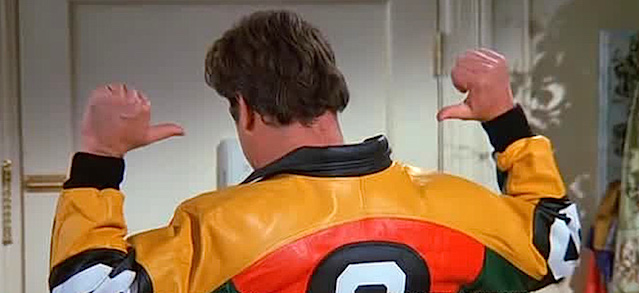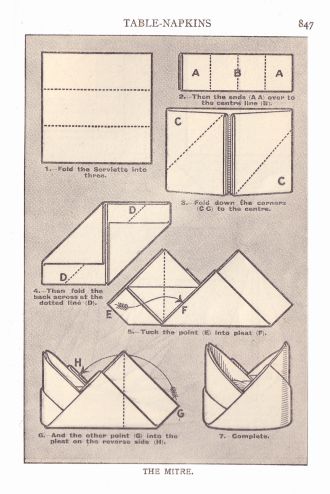
A scene from Seinfeld has been replaying in my mind this past week. One from the final season, when things got a bit cartoonish, in which Elaine finds out something surprising about her on-again-off-again mechanic boyfriend, David Puddy:
George’s suggestible appetite is a priceless touch. The key lines, though, are:
Jerry: So you prefer dumb and lazy to religious?
Elaine: Dumb and lazy, I understand.
As was their practice in all things, the writers didn’t let Elaine off the hook. They weren’t looking to exonerate her discomfort or Puddy’s piggishness so much as play the situation for laughs. The two of them are shown to be equally hypocritical, less invested in their convictions–such as they are–than feeling superior to the other. Meaning, they both worship the same god (the self), and the result is a breach in their relationship.
While Puddy may be one of the more hilarious caricatures of meat-headed Megachurchianity the small screen has produced, it’s not exactly a flattering (or accurate) portrait of evangelicalism. Yet speaking as a native Manhattanite, I’d be lying if I didn’t admit he bears a resemblance to the common presumptions that get tossed around in New York circles. On the other hand, for all her obvious smarts, Elaine is as shallow and vindictive as they possibly come. So it’s a sort of equal opportunity mocking, in which Christianity may be seen as mawkish and unsophisticated, but the alternative–if it can even be called such–is just as bad if not worse.
What brought the scene to mind was the Late Night exchange between Bill Maher and Stephen Colbert that aired a couple of weeks ago. While their repartee did nothing to endear the erstwhile Politically Incorrect host, the friction between the two made for some truly great TV. To wit:
Maher, as per usual, is painfully smug, his lack of any/all epistemological modesty as glaring as it is repulsive. (At least John Oliver feigns an occasional culpability). The fact that Maher hears Colbert’s semi-serious invitation to church as “a lecture” says a lot about the non-rational factors driving such an avowed rationalist. And the disparagement of “the Bronze Age” cracked me up, as though we’d be better turning to the sages of our current age for wisdom, to say nothing of the suggestion that genuine wisdom wouldn’t have some staying power, that it might–gasp!–transcend its context. Anyhoo…
What I found most interesting was Maher’s suggestion re: ISIS, that bodycounts are not the answer. You have to “wipe out” the ideas behind the attacks rather than the people who hold them. In one sense, he’s right. Whatever ideological or religious framework is providing the justification for such atrocity must be dismantled, no question. Where Maher falters is in his anthropology. Meaning, as dangerous and awful as an idea can be, the real problem with human beings lies deeper than the intellect. No ideology, no matter how egalitarian or compassionate, can eliminate sin.
In fact, as The Leftovers has so brilliantly illustrated this season, you cannot merely tear down an idea, not where human hearts are involved. We are not self-sufficient creatures; none of us can survive in an existential vacuum–which is where Maher’s form of cocksure atheism leaves people. You can dress it up in admirable values all you want, but if there’s nothing at the core other than human so-called resilience, despair will set in eventually. Some would say that Maher’s transparent bitterness (see: his comments about American stupidity) is a foregone conclusion of a false anthropology.

I recognize that Bill Maher is a straw man if ever there was one, hardly emblematic of anyone but himself (and maybe a few other insufferable New Atheists). Fortunately, the blanket hostility to religion he espouses is not nearly as commonplace as certain pundits would have us believe, limited primarily to the Academy and the Internet.
Truth be told, I wasn’t planning to comment on any of it until I saw the same extremism born out in a separate example of subtraction-qua-subtraction. I’m referring to Downton Abbey. To promote the series drawing to a close, the show’s historical adviser, Alastair Bruce, gave an interview to The Telegraph in which he let fly some alarming comments about the extent of his secularist brief:
[Bruce] said that executives in charge of the series had ordered producers to “leave religion out of it”, for fear of alienating an increasingly atheistic public.
Eagle-eyed viewers may have noticed that the Crawley family is never shown in the process of sitting down to dinner, with the action instead shown from part-way through the meal. This, Mr Bruce said, was to avoid having to show the characters saying grace.
Mr Bruce said that he was even banned from featuring napkins folded in the shape of a bishop’s mitre, for fear of breaching the religious edict. “Everyone panics when you try to do anything religious on the telly,” he said. “I still wish we could’ve got some decent napkin folds, but I was always left with my triangle.”
 Downton may be a trivial example. Art and entertainment should be free to pursue the stories and angles they wish to pursue, independent of concerns about comprehensiveness or whatever. No show can thrive under that kind of mandate.
Downton may be a trivial example. Art and entertainment should be free to pursue the stories and angles they wish to pursue, independent of concerns about comprehensiveness or whatever. No show can thrive under that kind of mandate.
That said, there’s a difference between artistic license and the scrubbing out of even the most tertiary reference to religion–which strikes me as the opposite of license. After all, the urge to edit the past so that it never touches on anything potentially alienating or upsetting (or hopeful, as the case may be!) is anything but trivial, not just historically but personally. Once we start down the road of censoring the past according to the ever-shifting dogmas of the present, we only ensure that we will fall under the eraser ourselves eventually. (Which might not be such a bad thing, I suppose).
What does any of this have to do with Seinfeld? A couple things. First, the very fact that the Elaine-Puddy predicament was shown on a network sitcom is remarkable. Humorous treatments of the secular-religious dynamic these days tend to be either super safe or mean–and therefore less funny. The word “hell” certainly wouldn’t come up.
Second, Ms. Benes’ admission that “dumb and lazy, I understand” stick out. It implies a shred of modesty on 1998 Elaine’s behalf. She makes an allowance, however small, for her own ignorance. One suspects that a 2015 Elaine–at least as written by Maher (or Oliver)–wouldn’t claim to have difficulty understanding Puddy’s faith. She would simply belittle it, maybe even dismiss it as categorically dangerous. Which is sad, as mutual bafflement is a much more promising entry point for discussion than disdain.
Cue Stephen Colbert, who is somehow able to enter into the tension and evince–in real time–a far more compelling and humble alternative to Maher’s ironclad, aggressive secularism. Discussing the interchange on Mere Orthodoxy, Dustin Messer spelled it out this way:
Just before taking on CBS’s Late Night, Colbert famously said “To be a fool for Christ is to love.” I’m not sure I fully understood what Colbert meant by this until his Maher interview. Colbert could have resolved the tension with Maher in a different way. He could’ve laughed off the question of faith and made an easy Trump joke, but that’s not what he did. He embraced the tension. He entered into the foolishness…
Why? Why did Colbert chose to resolve the tension by inviting Maher back to church, back to fellowship with Christ and his people? Colbert tells us: love. Had he been motivated by, say, peace, he could’ve saved face and changed the subject. For the sake of peace he could’ve let sleeping dogs lie. But out of love—love for his Savior, love for his church, indeed love for Maher—Colbert made a fool of himself on national television by giving a soliloquy just shy of a Billy Graham sermon to none other than Bill Maher. Knowing that everyone thought he was wrong, perhaps evil, and certainly a fool, he spoke out of love.
For fifteen brief minutes, Colbert bore witness to something that truly defies the logic of rational exchange, the very thing that all of us Elaine’s find so incomprehensible, especially when poured out on the Puddy’s of the world: the love of one’s enemies, AKA space and a microphone granted to those who would actively seek our subtraction.
Colbert clearly isn’t threatened by Maher, so much so that he can laugh at the digs. Yet his laughter appears to flow from freedom rather than ridicule. Perhaps this is because he knows that diminishment and humiliation is not a bad place to be. It is where we find something much more powerful (and considerably more hilarious) than any ideology–the only alternative worth its weight in fishsticks, namely, a living God.

COMMENTS
12 responses to “Fishing for Secular Napkins (with Bill Maher, Stephen Colbert, and Elaine Benes)”
Leave a Reply













D- love this so much. The laughter of freedom is at home in the theology of the cross!
Thanks I! It’s actually a prelude to something on The Benedict Option. I got sidetracked…
I am so pleased! Very interested to read your take on BenOp!
Great post, thanks…comedy is a pretty good cultural common ground for interaction and Colbert is pretty adept to say the least. Gonna have to watch this Leftover show when there’s are enough shows to satisfy my need to binge.
That reminds me of the G.K. Chesterton quote that “Humor can get in under the door while seriousness is still fumbling at the handle.”
Love that!
“…from freedom rather than ridicule.” I love this. The only apologetic that has a measure of hope. Reminds me of the great breakout talk that Jacob Smith gave at an Mbird conference a few years back. A humble and sincere invitation.
Christian organizations who train people how to share their faith should make Colbert’s interview with Maher required viewing. Instead of being judgmental, offended, and alienating, Colbert embraces Maher, and at the same time, holds to the truths that he believes. As you said, he “enters the tension” and with such wit and humor.
So says another humble and humorous Roman Catholic, GK Chesterton, on what would appear to be the difference between the old, at least respectable atheists, and the new, embarrassing atheists: “A man is perfectly entitled to laugh at a thing because he happens to find it incomprehensible. What he has no right to do is to laugh at it as incomprehensible, and then criticize it as if he comprehended it.”
Incredible quote. thanks for sharing.